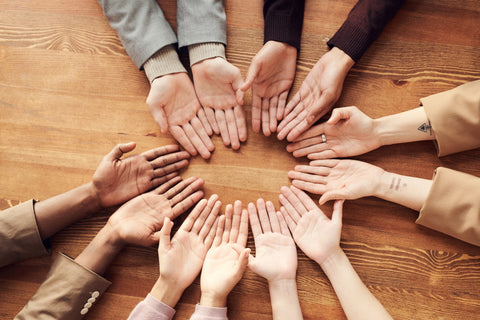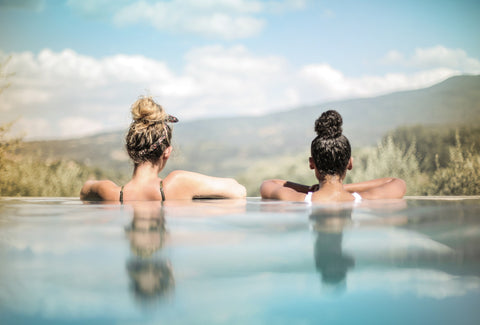“Love your neighbor as yourself."
As children we’re taught the “golden rule” – treat others the way you want to be treated.
What does this commandment, this truth, really mean? How can we learn to fulfill it in our every day lives to enhance the quality of both the world around us, and our own experience in it?

How To Love Your Neighbor As Yourself
The first, and most obvious thought that comes to mind when trying to understand the importance of loving your neighbor as yourself is that we must be kind to one another. But I believe that if we want to truly learn how to love the world around us and everyone in it the way we love ourselves, we first have to answer a different question.
How do I love myself?
Without knowing whether and how to love and be kind to ourselves, we can’t help but have difficulty loving others the same way. We usually take the idea of “loving ourselves” to refer to this imaginary concept of how we’d treat ourselves if we were separated from ourselves, but still experienced life as “who we are.”
What most of us fail to realize is that we ARE in constant relationship with ourselves.
Unfortunately that relationship is usually characterized by constant judging of oneself, talking to oneself negatively, and putting all of our time and energy into what other people think about us.
The way we treat others more or less mirrors the way we treat ourselves in the world that each of us, and only us, experiences personally within our own reality.
We each experience life on two different levels.
On the level of the outside world, we’re taking action, making decisions, dealing with other people, becoming professionals, supporting our families, etc.
But inside of ourselves, we each have this wholly unique experience of the things, the events that are happening in our lives. No two people judge the same experience identically. No two people interpret outside information the same way. Even if two lives were identical, no two people have the same conversation in their head throughout the day.
If we can transform our relationship with ourselves to one of kindness, acceptance, and love, we will inevitably begin to love our neighbors with the same quality.
Learning To Love Myself
“Accept yourself, love yourself, and keep moving forward. If you want to fly, you have to give up what weighs you down.”
― Roy T. Bennett, The Light in the Heart
We’re much less kind inside of ourselves than we imagine we would be if we were separated from ourselves. We often expect the outside world to conform to our needs and desires, but it’s questionable whether we properly satisfy our own needs.
Learning to love ourselves takes constant effort to see how exactly we treat this internal relationship we have – our personal experience of the lives we’re each living. We often think there’s something “wrong” with us when we act differently than we wish to in our lives – when we procrastinate, when we don’t follow through on the things we say we want, when we “disappoint” others, when we feel any “negative” emotion.
Loving ourselves must first come from an acceptance of being a human.
Part of being human is experiencing this whole spectrum of feeling, of positive and negative thoughts. We need to be able to tell the difference so that we can hopefully decide for ourselves what is worthwhile and what isn’t.
The first step towards letting go of what weighs you down is recognizing it.
Once we accept that there is a range of emotion, thought, and physical sensation that we’re going to come into contact with, transforming our internal experience of life becomes about beginning this process of discarding what is unnecessary to enhance the quality of each of our experiences.
Through this process of recognizing that we are in relationship to ourselves, and that the quality of that relationship can be altered by seeing how we treat ourselves, we may learn just what it means to “love myself.”
Learning To Love Others
“Be one who nurtures and who builds. Be one who has an understanding and a forgiving heart, who looks for the best in people. Leave people better than you found them. If we could look into each others hearts and understand the unique challenges each of us faces, I think we would treat each other much more gently.”
– Marvin J. Ashton
Learning to truly love and accept others is very similar to the process of transforming your relationship with yourself.
The same way that we have to accept that we are human and we each have this internal life in which we can be more kind to ourselves, we have no choice to accept that each and every person living on this planet has a life that is just as real to them as yours is to you.
There’s a truth that I came across that radically transformed the way I behave in relationship to others.
Nobody has ever, in the history of time done anything that believed was the WRONG thing to do.
Take a moment to digest that. Have we ever in our lives done something because we thought, at the moment, that it was the exact opposite of the right thing to do?
Every decision we make, every action we take, every word we say doesn’t always seem perfect in hindsight. In fact, our minds almost always make them wrong in hindsight. But at the moment that we act, we believe that we are doing and behaving in terms of what is “right” to us.
The only difference between any two people is the way they experience the events that are happening in their lives.
So the next time you want to judge yourself or anyone else, remember this.
We all have expectations. We all have problems. We all have desires. We all crave love and relationship. We all have places to go. We all have a need to feel as if we’re contributing to the world.
We’re all doing our best.
If you can remember this, and understand that you always act and behave in terms of what makes the most sense in the moment, you can truly begin to love yourself.
And if you can remember that if you were anyone else you’d behave exactly as they do, you can begin to love your neighbor as yourself.

